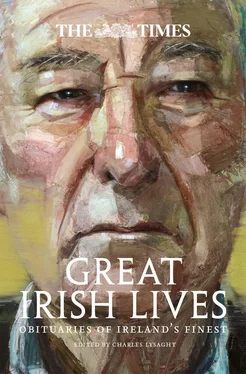The return of the party called Conservatives to power in 1841 was the signal for renewed agitation in Ireland, and this led to a lengthened interruption of Mr O’Connell’s Parliamentary labours; here, therefore, a fitting opportunity presents itself to state one or two circumstances which were not immediately connected with that portion of his career. In 1834 he received a patent of precedence next after the King’s second Serjeant. When the Dublin corporation was reformed he was elected Alderman, and filled the office of Lord Mayor in 1841–2. Mr O’Connell was appointed a magistrate of Kerry in 1835, but during the violent excitement which prevailed in 1843 the Lord Chancellor thought it necessary to remove him from the commission of the peace. He had controversies with all sorts of people, and was charged with sundry crimes, public and private; with having taken bribes from the millowners of Lancashire to speak against all short time bills; with having, even in his old age, seduced and abandoned more than one frail member of the fair sex; with having neglected and oppressed his tenantry to an extent which justified his being described as one of the most culpable individuals belonging to the vilest class in all Europe – the middlemen of Ireland. The evidence on which the other two accusations rest is rather doubtful; but the clearest possible proofs of his misconduct as a landlord were, in the year 1845, given to the public by The Times Commissioner. His expectations of office, of patronage, of power, and even of titular distinction are understood to have been quite as ardent as those of men who made no pretension to the liberal or the patriotic. It has been said, and generally believed, that he aimed at a baronetcy, and even hoped for a seat on the bench. The present age may well felicitate itself on the fact that O’Connell was not raised to judicial authority; for, instead of displaying any quality approaching to the calm impartiality of a judge, it had always been his practice to place himself in a position of hostility to every class, or at least to the representatives of every class in the community except the lowest. If the reader will only take the trouble to cast a glance over the index of any periodical publication which records the events of these times, he will find in letter 0, under the head “O’Connell,” – “Abuse of the Wesleyan Methodists; abuse of the Freemasons (by whom he was expelled in April, 1838); abuse of the Chartists; abuse of the English Radicals,” nay, even of the English women; “abuse of the King of Hanover, of the late Duke of York, of George III., of George IV., of the English aristocracy, of the Irish aristocracy, of the French Government, and especially of the French King;” to say nothing of his onslaughts upon Perceval, Liverpool, Wellington, Peel, and the head of every Tory Ministry; upon the established church, on the Dublin University, on the judges of the land, – upon every class and institution except the Irish populace and the church of Rome; thus labouring, day and night, to maintain the spirit of agitation just short of the point at which men are accustomed to burst forth into open rebellion. This peculiar system of his reached its culminating point in 1843. It is scarcely necessary to remind the reader that, to some extent, the subject of this memoir belonged to a political party, and, though at times he would call his political friends “base, bloody, and brutal Whigs,” yet, usually, when the Liberals occupied the Cabinet, he endeavoured to keep Ireland in a state favourable to Ministerial interests; but on all occasions when the Tories were in the ascendant, the full might of democratic agitation was brought into the field. In the autumn of 1841 Sir R. Peel became First Lord of the Treasury. Early in the spring of the following year a repeal of the union was demanded by every parish, village, and hamlet, from the Giant’s Causeway to Cape Clear, while a fierce activity pervaded the Repeal Association. In the course of the next year (1843) “monster meetings” were held on the royal hill of Tara, on the Curragh of Kildare, on the Rath of Mullaghmast, and in a score of other wild localities; the Irish populace were drilled, and marshalled, and marched under appointed leaders, whose commands they obeyed with military precision, while the master-spirit who evoked and ruled this vast movement announced to all Europe that he was “at the head of 500,000 loyal subjects, but fighting men.” The Irish press enjoined “Young Ireland” to imitate the example of 1798, and open rebellion was hourly apprehended. At length the crisis arrived; the great Clontarf meeting was summoned; a Government proclamation to prohibit that assemblage went forth, the military were called out, and the grand repeal agitation shrank into nothingness at the mere sight of artillery and Dragoons. The intended meeting at Clontarf was fixed for the 8th of October, 1843; on the 14th of that month O’Connell received notice to put in bail; on the 2nd of November proceedings commenced in the Court of Queen’s Bench; the whole of Michaelmas Term was consumed by preliminary proceedings, and the actual trial did not begin until the 16th of January, 1844. Twelve gentlemen of the bar appeared on behalf of the Crown, and sixteen defended the traversers; who then can wonder that this remarkable trial did not close till the 12th of February? At length Mr O’Connell was sentenced to pay a fine of 2,000 l . and be imprisoned for a year. He immediately appealed to the House of Lords by writ of error, but pending the proceedings on the question thus raised, he was sent to the Richmond Penitentiary, near Dublin, where for about three months he seemed to spend his days and nights most joyously. On the 4th of September the House of Lords reversed the judgment against O’Connell and his associates, Lords Lyndhurst and Brougham being favourable to affirming the proceedings in the Irish Queen’s Bench, while Lords Denman, Campbell, and Cottenham were of an opposite opinion. Mr O’Connell was therefore immediately liberated, and a vast procession attended him from prison to his residence in Merrion-square. From the moment that proceedings were commenced against him in the preceding year he became considerably crest-fallen. By the result of those proceedings his supposed infallibility as a lawyer ceased to be one of the dogmas of his party; the utter failure of the repeal movement greatly impaired his credit as a politician; the enormous costs of his defence nearly exhausted the funds of the repeal association; and in the altered state of his fortunes it became no easy matter for him to devise new modes of agitation. In 1845 he expressed his determination to repair to London during the ensuing session, to support a repeal of the Corn Laws. When he re-entered the House of Commons in 1846 it became evident to every observer that he had not only suffered in purse and popularity, but very materially also in health; that though his mind was still unclouded, his physical energy had disappeared, and that he could never again hope to be the hero of a “monster meeting.” Still a considerable portion of his ancient influence had not yet passed out of his hands, and when the Whigs once more came into office he was restored to the commission of the peace, and exercised no small authority over the Irish patronage of the Crown, of course giving Lord John Russell, in return, the full benefit of his support, to the great dismay of the “Young Ireland” party, who regarded his adhesion to any British Ministry as a traitorous “surrender of repeal.” Long and loud was the controversy between those belligerents; but the reader may well be spared the trouble of perusing even an abstract of the gross invectives poured on his head by a swarm of indignant followers, or a detail of the concessions wrung from him by a hard necessity. Unfortunately for O’Connell’s posthumous fame, he now betrayed “a broken spirit,” though not “a contrite heart;” and the popular influence, as well as the moral courage, of the old agitator sank under the pressure of his youthful and vigorous assailants; then came the famine, the falling off of “the rent,” thin audiences at Conciliation-hall, and the indefinite postponement of repeal. Successfully to contend with these disasters would have demanded the energy of O’Connell’s early days; but old, infirm, and broken-hearted, he was alike incapable of a manly struggle or a dignified retreat; and when once more he attempted to take his seat in Parliament, he seemed to be only the débris of an extinuished demagogue. To amplify the tale of his decline and fall would be inconsistent with the general tone of a narrative which has treated indulgently the memory of one who in his long life-time seldom spared a fallen adversary. In thus closing his history it may be well to avoid the contagion of his example, and to practise a forbearance of which he was incapable; for though to the crowd of his adherents he always seemed a munificent patron, yet small is the number of those who could sincerely say he had ever been a true friend or a generous enemy.
Читать дальше












